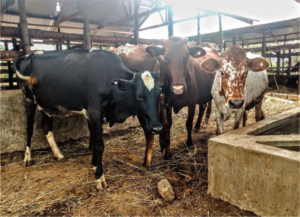
Photo: Improved cattle on the supplier farm (own picture)
Author: Jakob Trappe
Financialisation is described as “the dominant force changing capitalism, shifting the gravity of economic activity from ‘real’ production (primary, manufacturing and services) to finance (investment banking, insurance, arbitrage, asset management, venture capital, currency trading and so on). Even non-financial firms are increasingly oriented towards financial rather than ‘productive’ profits“ (Milberg 2008 cited in Mawdsley 2018: 26). Financialisation has also reached the field of agricultural development with the New Alliance for Food Security and Nutrition in Africa launched by the G7 and the United States Agency for International Development (USAID) in 2012 to lift 50 million African people out of poverty through agri-business investments until 2022 as a reaction to the global food price crisis of 2007/2008 (Brooks 2016: 770). It can be read as a continuation of the old paradigm of connecting smallholders to markets, but now in the new form of value chain interventions (ibid.).
The agricultural sector of Tanzania, which employs nearly 70% of the national workforce and contributes to over 30% of the national GDP, is still very relevant to the national economy (Lupatu 2017). Although the Tanzanian market is perceived to have huge growth potential and there has been a growing interest of investors in the agricultural sector since the early 2000s, Tanzania is not as favored as an investment 91 Tanzania Excursion 2022 destination as Kenya (Lupatu 2017; Ouma & Katundu 2020: 1). This is owing to specific market characteristics and challenges: the dominance of smallholders (owning less than 5 acres of land), lack of infrastructure, currency volatility, overregulation, and a bulky agricultural tax regime with currently 73 different taxes (Lupatu 2017; Ouma & Katundu 2020: 2).
Read more: Financialisation of Agricultural Development
